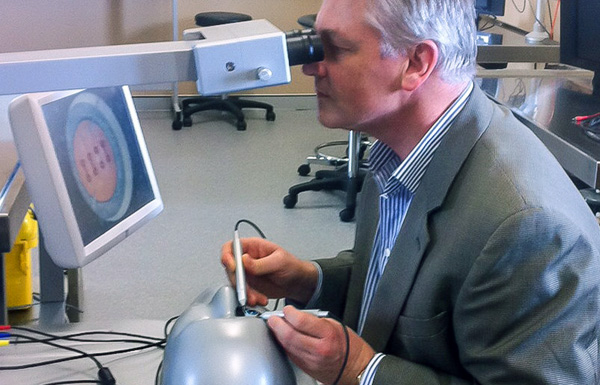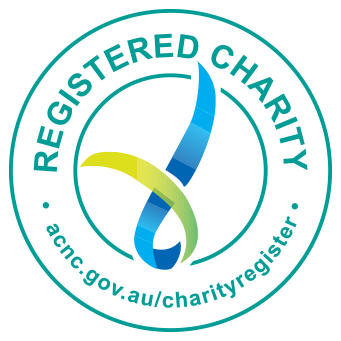The inaugural ANZ Microsurgical Course was held at the Sydney Eye Hospital from 25 – 27 October 2018. The two-and-a-half day course was attended by 19 doctors from around Australia and New Zealand.
The doctors themselves were either first year ophthalmology registrars or medical residents aiming for a career within ophthalmology. The course was a collaborative effort from the ophthalmology departments of the University of Sydney and University of Otago. Dr Graham Wilson of Gisbourne NZ (Clinical Senior Lecturer University of Otago and Principal Investigator, Vision, The Dunedin Study) has had the inspiration to set up this course for the last three years. The course has been modelled on the very well-known Royal College of Ophthalmologists Microsurgical course held 11 times each year and compulsory for all UK ophthalmology trainees.
The course was held in the Sight for Life Foundation Wet lab on level 2 North block of Sydney Eye Hospital. The world class training facility provided a number of innovations in training unique to the ANZ course. The attendees had access to human cadaver heads which provided the most authentic way of practising their surgical techniques. All students also trained on the Eyesi cataract surgery simulator to better assess their intraocular dexterity and skills. An educational grant from J&J surgical allowed for the purchase of 10 pharmabotics surgical skill boards. These boards allow for doctors to practise surgery on artificial skin and globes and were developed for the UK course. This was the first time such skills boards were used in Australia for training.
The course this year had the honour of inviting Mr Nigel Cox (Consultant Ophthalmologist in Great Missenden, Buckinghamshire) who set up the first UK microsurgical course in 1990 and has enormous experience in training residents and registrars in skills and approaches to microsurgery. He provided a number of lectures and course notes that greatly enriched the ANZ course. He had an excellent rapport with all attendees and we aim to invite him back again for future courses.
The skills taught and practised by all doctors included:
- Wound repair on pigs eyes: lamellar corneal wounds, full thickness corneoscleral wounds, ruptured globe repairs
- Oculoplastic techniques on human cadaver heads: lid wedge excision, periorbital anaethesia, skin excisions and flap repairs, subtenons anaethesia, peritomy, ocular muscle detachemnet and re-attachment, enucleation, tarsorrhaphy techniques, canthotomy and cantholysis
- Cataract surgery using artifical eyes including IOL folding and implantation, draping and surgical antisepsis
The course had a teaching staff sourced from Australia and New Zealand. NZ supervisors included Dr Graham Wilson (Gisbourne), Dr Logan Mitchell (Dunedin), Paul Baddeley (Christchurch) and Oliver Comyn (Christchurch). Paul and Oliver are both UK-trained ophthalmologists who completed the UK course and provided unique insights into microsurgical teaching. Australian supervisors included Yves Kerdaron, Con Petsoglou and Simon Taylor, all from the University of Sydney with many years of teaching experience running wetlab sessions in the Sydney Eye Hospital training scheme. The ANZ course this year aimed for an intensive two-and-a-half days of supervised sessions with a high demonstrator to student ratio of 1:3 at all times. The course was supported by an online series of 10 lectures on all aspects of microsurgery that opened to course participants four weeks prior to the hands-on course commencing.
The course this year could not have been completed or as successful without the support from industry. We particularly appreciate the support of Johnson & Johnson Surgical, Alcon Surgical and Zeiss Australia. Johnson & Johnson Surgical surgical provided the artificial eyes, two phacoemulsification machines and all consumables, the ten surgical practise boards, meals for all sessions and a textbook on cataract surgery for all trainees. Alcon provided four cataract machines with consumables and held a course dinner at Lotus restaurant. Zeiss provided two additional microscopes to make for ten microsurgical workstations. The Sight for Life Foundation provided incredible onsite support and consumables to ensure the smooth running of the course.
The Universities of Sydney and Otago expect to hold the course twice a year, given the success of this first course, outstanding feedback from attendees and demand for places. It was encouraging to see the progress all the trainees gained during the two-and-a-half intensive days. Though demanding for all involved, it was a worthwhile teaching effort that will definitely benefit enrolled doctors and their future patients.

